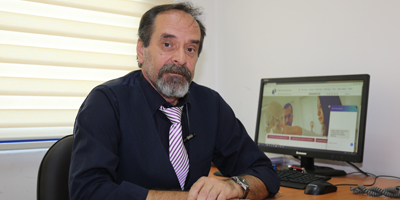EUL academician Meriç drew attention to the importance of rehabilitation in patients leaving the Covid-19 intensive care unit

European University of Lefke (EUL) Faculty of Health Sciences Physiotherapy and Rehabilitation Department Lecturer Assist. Prof. Dr. Aydın Meriç made explanations about “rehabilitation in patients leaving the Covid-19 intensive care unit” and gave detailed information.
“Critical patients who are followed up in intensive care due to Covid-19 may be exposed to prolonged inactivity, which may lead to neuromuscular weakness and later physical dysfunctions after being discharged from the Intensive Care Unit (ICU). Almost all ICU patients may experience a decrease in their daily life activities even a year after their discharge. Meriç stated that in studies in which critical illness survivors were followed observationally, these patients had problems not only in physical but also in psychological, cognitive, mental and health-related quality of life areas.
Meriç said, “The biggest problem for Covid-19 patients after leaving intensive care is that these patients continue to be isolated due to the duration of the possibility of contagion. However, patients can be highly dependent on personal care and activities of daily living, which is devastating for the patients and their families. This situation will cause physical and mental difficulties in the relatives of the patient. It is important to provide family members with simple and accurate information about the treatments received by the patient, to share the treatment and rehabilitation goals after this stage with the relatives of the patients and to respond to the concerns and expectations of the patient relatives ”.
“Rehabilitation units should aim to minimize the risk of the spread of Covid-19 among inpatients”
In the continuation of Meriç’s statement, “Since many discharged patients will need inpatient rehabilitation, it is important for rehabilitation centers to develop plans for recruiting a large number of patients from acute care facilities or directly from the ICU during the pandemic period. It is therefore important for inpatient rehabilitation units to plan an increase in admissions above their normal workflow, including patients requiring inpatient rehabilitation after exacerbation of pre-existing conditions such as stroke, trauma, and multiple sclerosis. In the context of a pandemic, when a patient who has been followed up and discharged from intensive care due to Covid-19 is “ready” for an inpatient rehabilitation facility should be well defined. Due to the risk of contamination, it is important to pay attention to isolation measures in every period of rehabilitation. There is not enough information about the duration and frequency of the program in patients included in the rehabilitation program. However, considering the nature of this disease; Considering the need for the protection of the treatment team and the economical use of resources, the optimal duration and frequency of treatment should be determined by the physician according to the patient’s condition. The rehabilitation program should be considered primarily in patients who are cardiac and respiratory stable. Rehabilitation units should aim to minimize the risk of the spread of Covid-19 among inpatients. To care for patients, healthcare providers must first be healthy themselves. Therefore, both inpatients and the rehabilitation team should be followed closely in terms of fever and respiratory symptoms ”.
“Physiotherapists working in exercise rooms and rehabilitation treatment clinics should work with their patients within the framework of social isolation rules”
Meriç said, “Physiotherapists working in exercise rooms and rehabilitation treatment clinics should work with their patients within the framework of social isolation rules, occupational therapists and speech therapists should serve in patient rooms. The whole team should be informed about the use of protective equipment. “Non-disposable medical devices used for patient care should be cleaned and disinfected according to the manufacturer’s instructions and facility policies and guidelines.”
Stating that “Patients who are discharged from intensive care units and do not need to receive rehabilitation inpatients should be sent to their homes with personalized home exercise programs,” Meriç said, it is not yet clear what Covid-19 disease will cause in post-disease organ functions, so patients should be followed up especially in terms of whether they need pulmonary rehabilitation or not. He emphasized that they should be controlled. Finally, Meriç concluded that the rehabilitation approaches to be applied in every clinical period of Covid-19 disease should be in the form of personalized treatment plans according to the patients’ ages, disease processes and expected recovery rates, and that the patient’s functionality, increase of independence and improvement of life quality can be achieved with a multidisciplinary, multi-faceted approach, and this He stated that the importance of coordination, communication and teamwork among health professionals in the context of healthcare professionals should be kept in mind.
